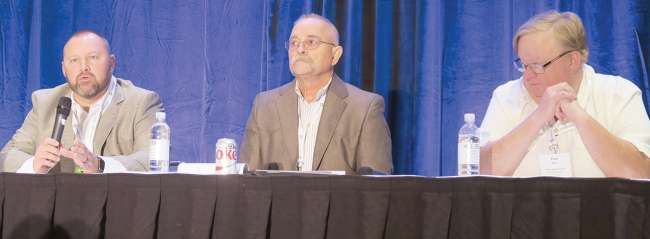Staff Reporter
ELD Education Must Apply to All Employees, Industry Reps Say

ATLANTA — Preparation for the electronic logging device mandate requires educating people at all levels of a trucking company, according to industry leaders who have adopted the systems over the past few years.
The federal ELD rule, which goes into effect Dec. 18, mandates that commercial drivers who are required to prepare hours-of-service records of duty status adopt the devices. Lamar Quinn, a sales representative from R.E. Garrison Trucking, said the driver is usually trained on ELDs first, but it’s also important to educate everyone at a company, especially the sales team.
Jerry Harris, vice president of vans and dedicated operations at Gypsum Express, said that ELD education must apply to payroll and human resources officers in addition to drivers and executives.
“The rules haven’t changed. It’s just a different manner of recording it,” Harris said at the McLeod Software User Conference Sept. 18. “How you approach the change with your people is one of the biggest things. You can’t do it halfway. It’s got to be everyone in the organization pulling in the same direction.”
"Choose your partners carefully"-Tom McLeod at the @McLeodSoftware #UC2017 conference pic.twitter.com/pxasrBCKyS — Eleanor Lamb (@eleanorannlamb) September 18, 2017
ELDs automatically track how many hours a driver has worked, making it more difficult for carriers to harass drivers into violating HOS limits. In effect, the ELD mandate will prevent carriers from requiring drivers to operate when their ability or alertness is impaired due to fatigue. Certain industry representatives, including smaller trucking companies and owner-operators, have resisted the ELD rule. For example, the Owner-Operator Independent Drivers Association has filed lawsuits to the Supreme Court against the mandate.
Gypsum Express has been using electronic logs for five years, Harris said. He said the company lost two drivers out of 500 who “wouldn’t even give it a chance.” Similarly, Best Logistics Group lost two drivers out of 300 who could not make the change to ELDs. Paul Davis, IT manager for Best Logistics Group, said one driver turned away from the devices after giving the “Big Brother” argument, while the other simply could not get the hang of the technology.
How you approach the [ELD mandate] with your people is one of the biggest things. You can’t do it halfway.
Jerry Harris, Gypsum Express
Harris said the biggest challenge since ELD installation has been working with planners to ensure that truck operators can usefully spend their time. For example, he said drivers would sometimes return to the distribution centers after a run and the planners would spend time deliberating on what delivery the driver should make next, instead of immediately sending the driver on his or her way.
“Too often, my planners were reactors. It really forces you to plan,” Harris said. “If they get up, start their clock, drive into our office and stand there for three hours while we figure out today’s game plan, we just wasted a third of their day. Really be cognizant of the clock running and not running.”
Another challenge is balancing the demands of people who require a firm delivery time but do not make parking accommodations for a driver, which Harris compared to throwing a dart to hit a target 500 miles away. A shortage of truck parking nationwide was the fourth issue on the American Transportation Research Institute top 10 concerns before the trucking industry in 2016.
HOS laws dictate when and how long truck drivers can operate. The purpose of HOS laws is to avoid exhausted drivers from endangering themselves and others on the road. The 14-hour driving window says drivers are allowed a period of 14 consecutive hours in which to drive up to 11 hours after being off duty for 10 or more consecutive hours.
“Things have to fall so specifically in line to make that happen. I tell them we’ll be as close as we can, but if we can’t park there, we do have to take our break and we have hours-of-service laws to contend with. Those places become a real challenge. We’re not there yet,” Harris said. “All of our in-house people who need to be educated, we’ve accomplished that. The outside world still doesn’t get it. That’s a constant battle, and I believe it will be for years.”


